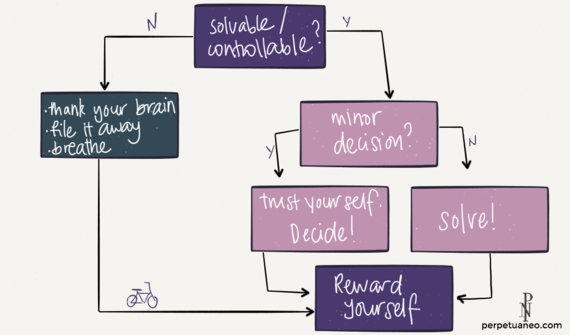The other day my friend asked if I could broach the subject of emotional wellbeing with her father. His generation is one where mental health awareness doesn't exist. She hoped that he'd have some peace from his long-standing anxiety, because he was suffering from a terminal illness. I had an hour, it wasn't therapy, but I thought we could reflect with seven questions about his relationship with anxiety. You see, one of my favorite things about cognitive behavioral therapy (CBT) is shining a torch into our mind -- our thoughts, assumptions and beliefs. Here are seven questions that I often use with my clients, that can help you learn more about your anxiety and bring you greater peace.
1. Is my worry controllable or solvable?
Things like the state of the world that worry us, and then there are hypothetical situations like a loved one dying. These are things we can't control or solve right now, and entertaining these worries increases our anxiety. If you've answered no to this question, then thank your brain for alerting you, because it's so used to doing that. Breathe deeply, and imagine mentally filing this worry into a safe space. Because suppressing your thoughts will magnify them with a vengeance, whilst treating yourself kindly will calm you down. This way, you've learned to deal with 95 percent of your worries.
2. Is this a minor decision?
If you've spent 20 minutes poring through a menu whilst your companion tuts away impatiently from near-starvation, or you fuss over renting from Amazon or Google Play (and then about HD vs. SD format), then perhaps you should reevaluate if this worry is a minor decision. If yes, then trust yourself to make a decision. You're capable of that, and you can save time and effort by not debating minutiae. If it is a major decision, then commit to solving it. Worrying doesn't solve your problem; you do.
3. Do I believe that worrying helps me to solve my problems?
Anxiety is a liar. We believe that it helps us to solve our problems, and so we allow ourselves to worry. But worrying shoves us down a spiral of anxious thoughts and feelings. An hour later, we realize that we haven't solved anything but instead leapt to distressing conclusions. We castigate ourselves for procrastinating, but worry further. We then feel unable to cope with our racing mind, tight stomach and accelerating heartbeat. As stated in #2, worrying will not solve our problems.That's one fact to etch into our minds every time we start entertaining our worries, thinking it's a useful thing to do.
4. Do I think that every thought popping into my head is important?
If you've answered yes to this, you're not alone. The first time I meditated, it shook me to realize that my thoughts are like clouds in the sky. Just as they come from nowhere, they also disappear into that same nowhere. This epiphany destabilized my understanding of thoughts. It taught me that thoughts can be triggered by anything -- seeing a raven cues memories of lying on The Tor, and smelling rosemary oil reminds me of my cat's death. I learned that not every thought needs to be entertained, and I'm much happier not letting them run amok.
5. Do I believe that worrying means I'll be prepared?
Sometimes we believe that worrying prepares us for all possible bad outcomes, or prevents us from missing out on something important. Someone once told me that when she moved into her new apartment, she started worrying about every eventuality. Six hours later, she compiled a list of emergency contacts and set up a Pinterest board on emergency quick-fixes. This project continued over the months, because she spent most of her hours worrying. Years later, a pipe burst. She felt "finally vindicated" that she could refer to her list and board. But she reflected it was tiring to keep preparing for an eventuality. She couldn't enjoy her house. If you think that worrying prepares you, perhaps ask yourself if you'd rather live your days feeling more at ease than hyper-vigilant for plausible eventualities.
6. When did I start being anxious-what happened, who did I learn from?
People are constantly anxious generally fall into two camps. The first say, "I've always been like that", and the second say "I never used to be like that until (insert event) happened." If you've always been anxious, think about what your situation was like growing up -- were there threats to your wellbeing that meant you were always on guard, or was there someone in your life who was often worried. Besides being genetic, anxiety is also learned. If you're in the second camp, something bad happening can shatter our understanding of the world, leading us to behave and see the world in very different ways. Worrying becomes our way of protecting ourselves.
7. How different are my conditions now?
Like many things in life, the more practiced an action, thought or feeling is, the likelier it is to be repeated. Back in 1888, Freud theorized that neurons that fire together wire together. Indeed, I like to use the analogy of worrying as a well-developed bulging muscle that operates on autopilot. Sometimes it takes us pausing to reflect on how different our conditions are now as compared to our childhood or when something bad happened. We then realize that it's time to let go of worrying all the time. It's time to give our peace and wellbeing a chance, because we deserve it. And when this happens, we can start to kill off our worrying muscle and instead nurture our kindness muscle.
Which of the following questions do you resonate most with, and which one do you find most helpful. Leave a comment and help someone with the same experience. Or, read more on how to deal with anxiety here.

